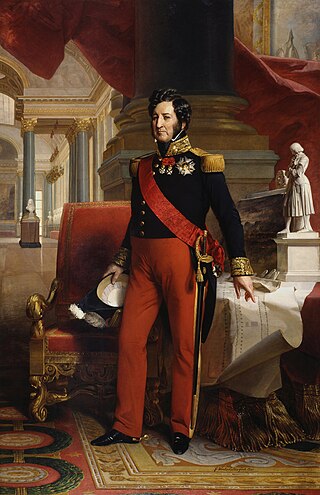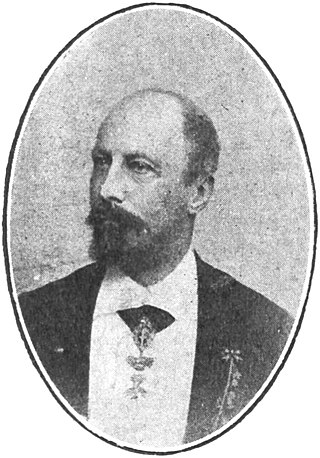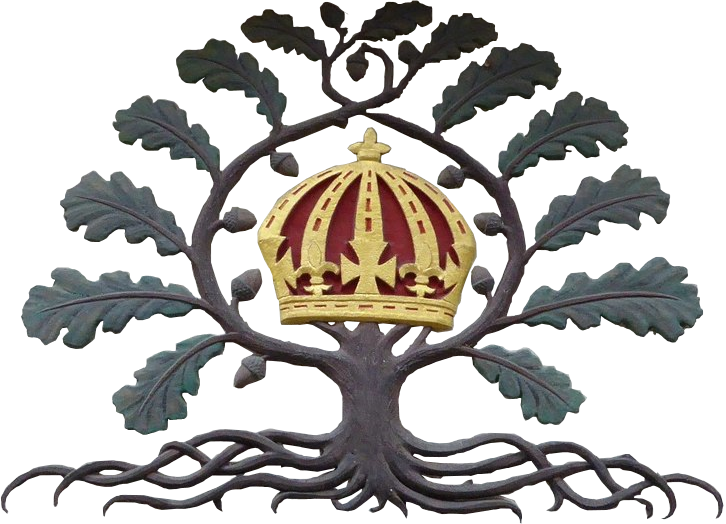
Dauphin of France, originally Dauphin of Viennois, was the title given to the heir apparent to the throne of France from 1350 to 1791, and from 1824 to 1830. The word dauphin is French for dolphin. At first, the heirs were granted the County of Viennois (Dauphiné) to rule, but eventually only the title was granted.

Louis Philippe was King of the French from 1830 to 1848, and the penultimate monarch of France.
A royalist supports a particular monarch as head of state for a particular kingdom, or of a particular dynastic claim. In the abstract, this position is royalism. It is distinct from monarchism, which advocates a monarchical system of government, but not necessarily a particular monarch. Most often, the term royalist is applied to a supporter of a current regime or one that has been recently overthrown to form a republic.

Henri, Count of Chambord and Duke of Bordeaux was disputedly King of France from 2 to 9 August 1830 as Henry V, although he was never officially proclaimed as such. Afterwards, he was the Legitimist pretender to the throne of France from 1844 until his death in 1883.

Orléanist was a 19th-century French political label originally used by those who supported a constitutional monarchy expressed by the House of Orléans. Due to the radical political changes that occurred during that century in France, three different phases of Orléanism can be identified:
The Count of Anjou was the ruler of the County of Anjou, first granted by Charles the Bald in the 9th century to Robert the Strong. Ingelger and his son, Fulk the Red, were viscounts until Fulk assumed the title of Count of Anjou. The Robertians and their Capetian successors were distracted by wars with the Vikings and other concerns and were unable to recover the county until the reign of Philip II Augustus, more than 270 years later.

Carlism is a Traditionalist and Legitimist political movement in Spain aimed at establishing an alternative branch of the Bourbon dynasty – one descended from Don Carlos, Count of Molina (1788–1855) – on the Spanish throne.

Louis Alphonse de Bourbon is the head of the House of Bourbon. Members of the family formerly ruled France and other countries. According to the Legitimists, Louis Alphonse is considered the pretender to the defunct throne of France as Louis XX. With the death of his father, he has been using the title of Duke of Anjou since 1989.

The Legitimists are royalists who adhere to the rights of dynastic succession to the French crown of the descendants of the eldest branch of the Bourbon dynasty, which was overthrown in the 1830 July Revolution. They reject the claim of the July Monarchy of 1830–1848 which placed Louis Philippe, Duke of Orléans, head of the Orléans cadet branch of the Bourbon dynasty, on the throne until he too was dethroned and driven with his family into exile.

Alfonso, Duke of Anjou, Duke of Cádiz, Grandee of Spain was a grandson of Alfonso XIII, King of Spain, a potential heir to the throne in the event of the restoration of the Spanish monarchy as Alfonso XIV, and a Legitimist claimant to the defunct throne of France as Alphonse II.
Laws of succession govern the order of succession to various monarchies. Some laws of succession include:

Charles Philippe Marie Louis d'Orléans is a member of the House of Orléans. He is the elder of two sons of Prince Michel d'Orléans, Count of Évreux, and his wife Béatrice Pasquier de Franclieu. His paternal grandfather was Henri, Count of Paris, the Orléanist pretender to the French throne. As such, Charles-Philippe takes the traditional royal rank of petit-fils de France with the style of Royal Highness.

The 4th House of Orléans, sometimes called the House of Bourbon-Orléans to distinguish it, is the fourth holder of a surname previously used by several branches of the Royal House of France, all descended in the legitimate male line from the dynasty's founder, Hugh Capet. The house was founded by Philippe I, Duke of Orléans, younger son of Louis XIII and younger brother of Louis XIV, the "Sun King".

Infante Jaime of Spain, Duke of Segovia, Duke of Anjou, was the second son of Alfonso XIII, King of Spain and his wife Princess Victoria Eugenie of Battenberg. He was born in the Royal Palace of La Granja de San Ildefonso in Province of Segovia, and was consequently granted the non-substantive title of "Duke of Segovia", courtesy he held along with "Duke of Anjou" as the Legitimist pretender to the French throne. Jaime was a great-grandchild of Queen Victoria of the United Kingdom.

The 16 May 1877 crisis was a constitutional crisis in the French Third Republic concerning the distribution of power between the president and the legislature. When the royalist president Patrice MacMahon dismissed the Opportunist Republican prime minister Jules Simon, the parliament on 16 May 1877 refused to support the new government and was dissolved by the president. New elections resulted in the royalists increasing their seat totals, but nonetheless resulted in a majority for the Republicans. Thus, the interpretation of the 1875 Constitution as a parliamentary system prevailed over a presidential system. The crisis ultimately sealed the defeat of the royalist movement, and was instrumental in creating the conditions for the longevity of the Third Republic.
Louis, Dauphin of France, or variations on this name, may refer to:
Monarchism in France is the advocacy of restoring the monarchy in France, which was abolished after the 1870 defeat by Prussia, arguably before that in 1848 with the establishment of the French Second Republic. The French monarchist movements are roughly divided today in three groups:
- The Legitimists for the royal House of Bourbon,
- the Orléanists for the cadet branch of the House of Orléans, and
- the Bonapartists for the imperial House of Bonaparte

François René de La Tour du Pin, Marquis de la Charce, was a French Military Officer, Politician and Social Reformer.

Monarchism is the advocacy of the system of monarchy or monarchical rule. A monarchist is an individual who supports this form of government independently of any specific monarch, whereas one who supports a particular monarch is a royalist. Conversely, the opposition to monarchical rule is referred to as republicanism.
The Neo-Jacobite Revival was a political movement that took place during the 25 years before the First World War in the United Kingdom. The movement was monarchist, and had the specific aim of replacing British parliamentary democracy with a restored monarch from the deposed House of Stuart.











